Top 12 RPA Service Providers in the USA
Discover the leading RPA service providers in the USA with our list of the top 12 companies. From comprehensive automation solutions to industry expertise, these providers offer cutting-edge Robotic Process Automation services to help businesses optimize processes, increase efficiency, and drive digital transformation.
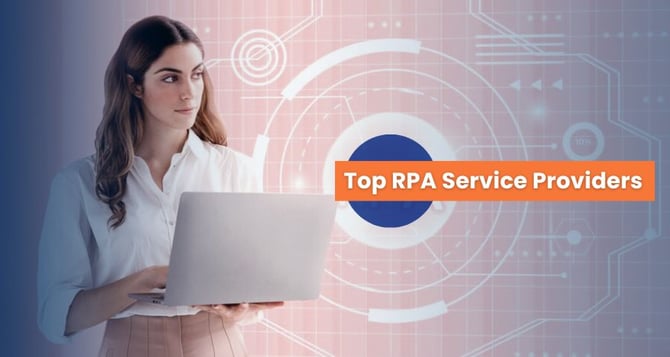
Robotic Process Automation is an essential fusion of automation and cognitive technologies like Artificial Intelligence and Machine Learning that have the power to streamline rules-based repetitive business processes, enabling bots to make human like intelligent decisions.
However, the integration of RPA with legacy systems determines the scope of RPA and its ability to drive great revenues for businesses.
So, selecting the right RPA provider who can understand the unique business requirements and cater to the needs plays a vital role in successfully implementing RPA solutions.
Enabling organizations to choose the right RPA provider to work with, here we have crafted a list of the Top 12 Most Popular RPA Service Providers of 2024.
This list comprises skilled RPA Providers with industry-rich experience, technically adept teams, and a proven record.
12 Most Popular RPA Service Providers of 2024
Here is a list of top RPA service providers in the USA for your reference. Find the best one that matches your requirements and start automating your routine high-volume tasks seamlessly, optimizing your repetitive business processes.
1) UiPath
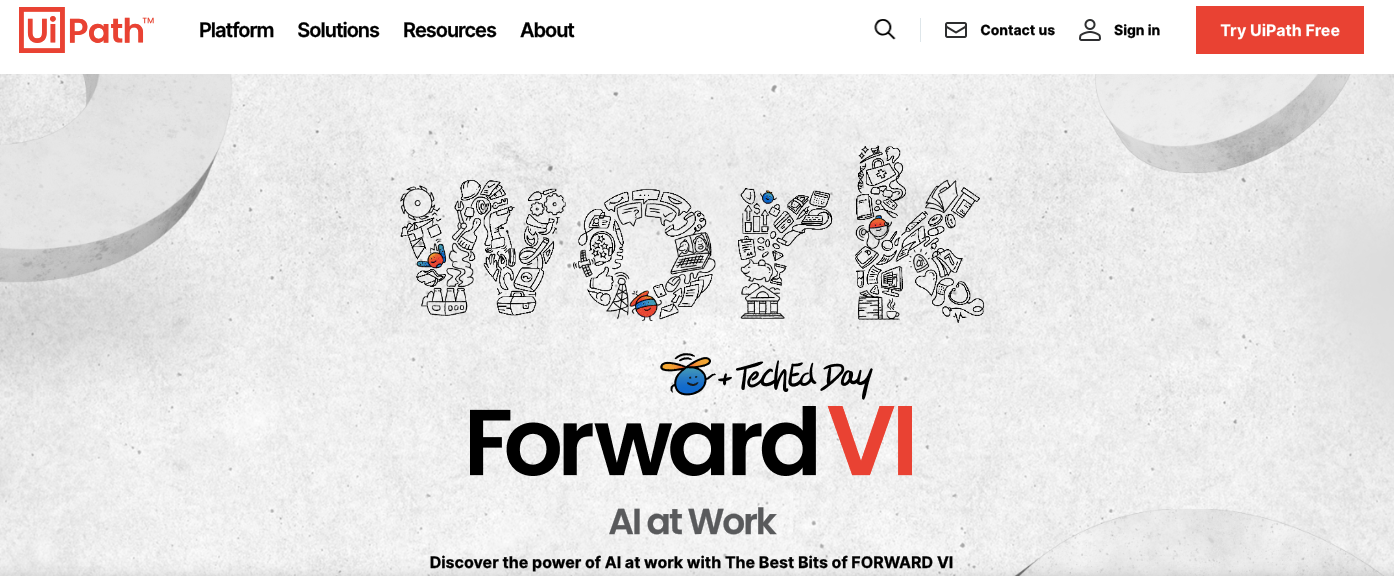
UiPath provides all core capabilities. It provides support for Citrix. It is user-friendly for non-developers, too. It can handle complex processes. And this tool is perfect for any size of business.
Founded: 2005
Benefits:
- It provides security by managing credentials, providing encryption, and access controls based on the role.
- It can automate faster. Eight to ten times faster automation through Citrix, too.
- It provides an open platform.
- It can handle any process, in any number, irrespective of its complexity.
- It requires less coding.
Target Industries:
UiPath's customers come from various industries, including banking, healthcare, insurance, government, manufacturing, retail, and telecom. UiPath RPA platform caters to organizations across multiple sectors looking to automate their business processes.
Key RPA Features:
UiPath offers a comprehensive set of features for Robotic Process Automation (RPA), including:
- Workflow Designer: An intuitive visual interface for creating automation workflows.
- Recording: Ability to record and capture user actions to automate repetitive tasks.
- Orchestrator: A centralized platform for managing and monitoring automation processes.
- AI Capabilities: Integration with AI technologies like optical character recognition (OCR) and natural language processing (NLP) for advanced automation.
- Bot Development: Tools for building and configuring software robots (bots) to perform tasks.
- Integration: Support for integrating with various systems, applications, and databases.
- Analytics and Reporting: Insights and reporting features to monitor and optimize automation performance.
- Security and Governance: Features to ensure data security, access control, and compliance.
Pros:
- User-friendly interface with a visual workflow designer.
- Extensive library of pre-built automation components.
- Scalable architecture to handle complex automation scenarios.
- Strong community support and a large marketplace for reusable automation components.
- Broad integration capabilities with third-party systems.
- Robust security and governance features.
Limitations:
- The steep learning curve for complex automation scenarios.
- Limited support for non-Windows environments.
- Higher licensing costs compared to some other RPA tools.
- Some advanced features may require additional coding or technical expertise.
- Limited support for mobile automation.
Pricing:
UiPath offers various pricing plans based on the specific needs of organizations. The pricing structure includes both annual and monthly subscription options.
2) Signity Software Solutions
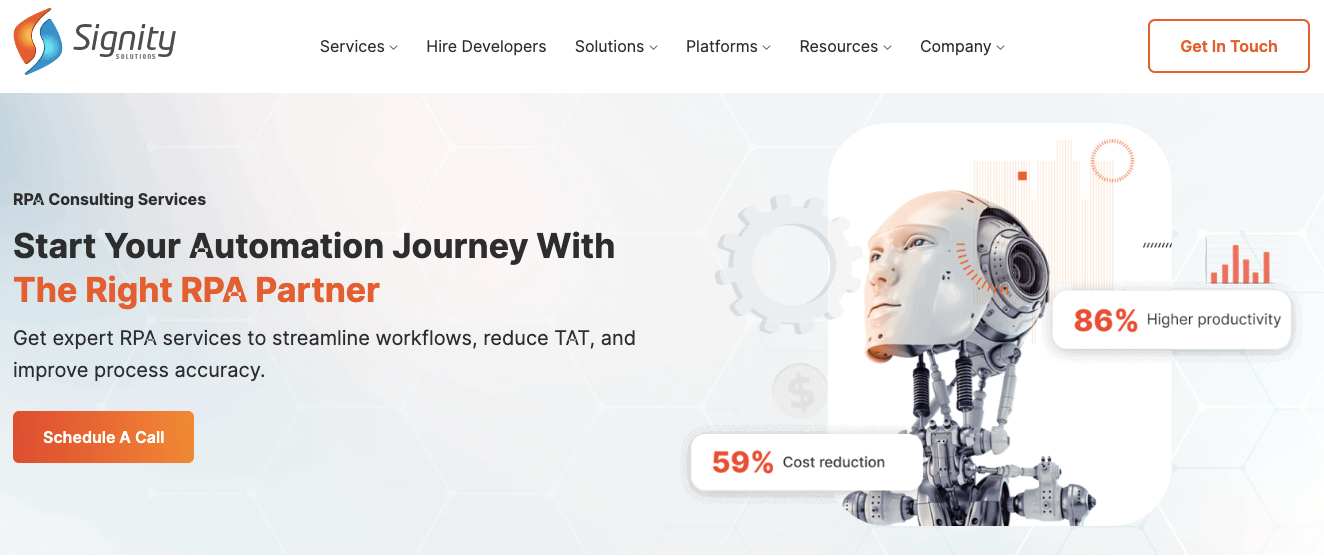
Signity Software Solutions is known as one of the best Robotic Process Automation providers across the globe, as they offer AI development technology as well as robust RPA solutions. Depending on the support you need, you can choose between desktop automation for web and desktop tasks or enterprise automation.
Signity sets itself apart from other RPA providers by taking a customer-first approach. The idea is that every tool you can access with Signity is intended to make your human employees’ lives easier. Signity also offers UiPath development services to its customers.
Benefits:
- It provides attended and unattended server automation.
- It will help you automate mundane tasks, Compliance adherence, and upselling.
- This system is for employees from the back offices, Finance, HR, etc.
- It provides cloud-based and on-premise solutions.
Founded: 2009
Target Industries:
Signity Software Solutions caters to businesses and organizations of all sizes and across various industries that aim to automate their business processes in Human Resources, Manufacturing, Finance & Accounting, E-Commerce, Telecom, and Custom Solutions.
#Case Study: Telecloud saved 750+ man-hours per month in accounting with RPA bots
-
RPA Opportunity Discovery: Identify automation potential and maximize ROI through comprehensive business operations analysis.
-
RPA Consulting: Expert assessment, roadmap creation, and strategic adoption guidance for RPA implementation.
-
Automation Support: Guidance for bot management, disaster recovery, risk management, and continuous opportunity discovery.
-
Automation Design: Mapping of manual processes, intervention model design, and clear RPA implementation view.
-
RPA Implementation: Design and develop bots using advanced technologies like ML, AI, and cognitive services.
-
Managed RPA Services: High availability, 24/7 monitoring, seamless process flow, and assistance with robot management, disaster recovery, risk management, automation scaling, and upgrades.
Pros of Signity Software Solutions:
- Comprehensive analysis of business operations to identify suitable automation opportunities
- Expert RPA consulting for strategic adoption and implementation
- Assistance in designing and developing bots using advanced technologies
- Managed RPA services for seamless process flow and increased uptime
Supercharge Your Efficiency with RPA!
Transform your business operations, reduce costs, and increase productivity with our RPA solutions.

Limitations:
- Specific pricing information and cost structure may vary based on individual requirements.
- Limited information is available on community support and user base compared to other RPA providers.
Partner: UiPath
3) Kofax
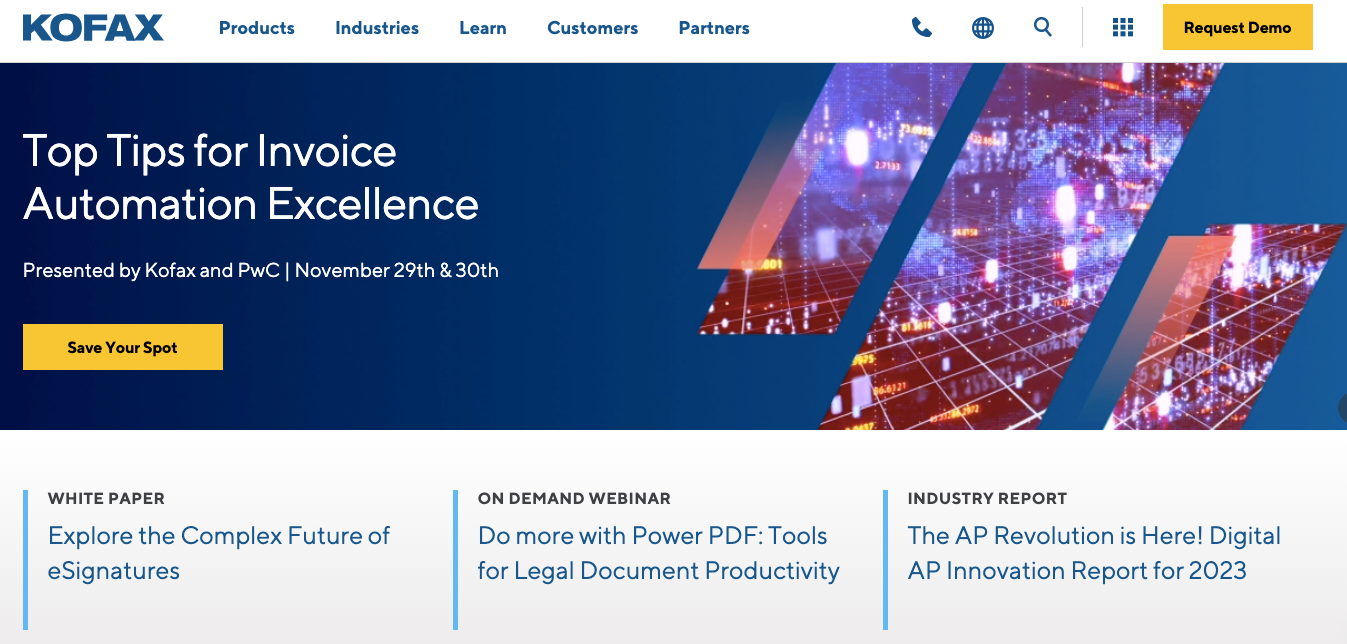
Kofax can work with any application virtually. Coding skills are not mandatory for this tool. It can process data from any website, desktop application, and portal.
Founded: 2005
Benefits:
- It does repetitive tasks efficiently.
- Intelligent tool for monitoring and optimizing processes.
- It can be managed centrally from a server.
- Easy to integrate with the Kapow Katalyst Platform.
Target Industries:
Kofax provides solutions that cater to a wide range of industries, including banking, insurance, healthcare, government, manufacturing, retail, and transportation.
Key RPA features:
- Intelligent automation: Kofax offers advanced capabilities for automating both structured and unstructured data, allowing organizations to automate complex business processes.
- Cognitive capture: The platform leverages AI and machine learning to extract and process data from various sources, including documents, emails, and images.
- Process orchestration: Kofax RPA enables the orchestration of end-to-end business processes, integrating with other systems and applications to streamline operations.
- Analytics and reporting: The solution provides insights and analytics to monitor and measure the performance of automated processes, helping identify bottlenecks and areas for improvement.
- Scalability and security: Kofax emphasizes scalability and provides robust security measures to ensure the protection of sensitive data.
Pros:
- Comprehensive automation capabilities that cover both structured and unstructured data.
- Advanced AI and machine learning capabilities for intelligent automation.
- Strong process orchestration and integration capabilities.
- Analytics and reporting features offer valuable insights for process optimization.
- Scalable and secure solution suitable for enterprises of different sizes.
Limitations:
- Pricing: Kofax's pricing structure can be complex, and the costs may vary depending on the specific requirements and scale of implementation.
- Learning curve: As with any robust automation solution, there may be a learning curve for users and administrators to become proficient in utilizing Kofax effectively.
Pricing:
Pricing for Kofax RPA is typically not publicly disclosed, as it can vary based on factors such as the scope of implementation, the number of users, and additional services required.
4) Softomotive
Softomotive is another RPA provider that helps companies put their repetitive tasks on autopilot. In particular, the Softomotive software aims to offer the smoothest RPA journey possible by giving businesses the guidance they need to start small with their AI solutions and gradually ramp up.
Founded: 2005
Target Industries:
Softomotive's RPA solutions cater to various industries and organizations, including banking, insurance, healthcare, manufacturing, retail, finance & accounting, e-commerce, telecom, and more.
Key RPA features:
- Process recorder: Softomotive provides a visual process recorder that allows users to easily capture and automate repetitive tasks by recording their actions.
- Drag-and-drop workflow designer: The platform offers a user-friendly interface with a drag-and-drop workflow designer, enabling users to create and customize automation workflows without the need for extensive coding.
- Screen scraping and data extraction: Softomotive's RPA tools include screen scraping capabilities, allowing users to extract data from various applications and systems.
- Integration and compatibility: Softomotive's solutions are designed to integrate with a wide range of systems and applications, enabling seamless automation across different software platforms.
- Error handling and exception management: The platform provides features to handle errors and exceptions that may occur during automation processes, ensuring smoother and more reliable execution.
Pros:
- User-friendly interface and intuitive workflow designer, making it accessible for users without extensive technical skills.
- Affordable pricing options are particularly suitable for small and medium-sized enterprises.
- Compatibility with a wide range of systems and applications, facilitating integration and automation across different platforms.
- Screen scraping capabilities for data extraction from various sources.
- Error handling and exception management features improve automation reliability.
Limitations:
- Limited advanced automation capabilities compared to some enterprise-level RPA platforms.
- The range of pre-built automation components and libraries may be more limited compared to larger RPA vendors.
- Softomotive was acquired by Microsoft in 2020 and has been integrated into Microsoft Power Automate. This integration may lead to changes in product offerings and pricing structures.
Pricing:
Pricing details for Softomotive's RPA solutions may vary based on factors such as the specific product edition, deployment model, and additional services required.
5) Pegasystems
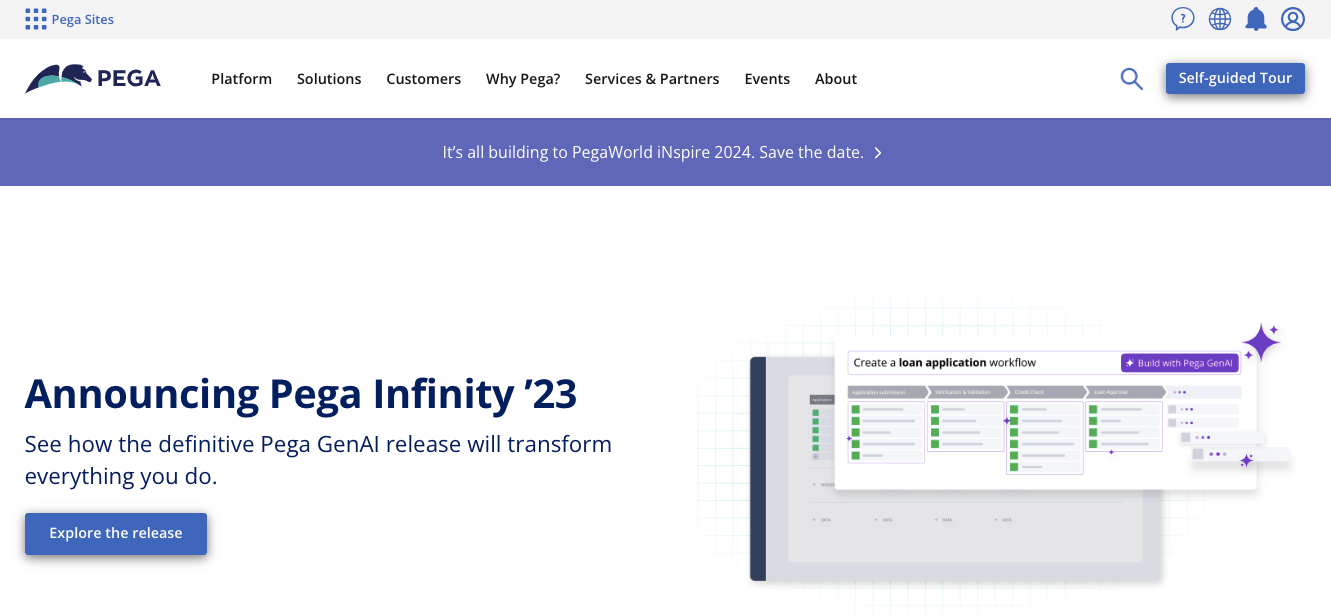
Another leading RPA provider Pega offers business process management, customer relationship management, and digital process automation, all in a comprehensive package. To streamline and enhance your company’s operations with state-of-the-art technology, look no further than Pega.
Founded: 1983
Target Industries:
Pegasystems' RPA solutions cater to various industries and organizations, including banking, insurance, healthcare, telecommunications, manufacturing, retail, and more.
Key RPA features:
- Robust automation capabilities: Pega's RPA platform offers advanced automation capabilities, including process automation, data integration, decision-making, and exception handling, allowing users to automate complex business processes.
- AI-powered automation: Pega's RPA tools leverage artificial intelligence (AI) and machine learning (ML) technologies to enable intelligent automation. They excel in advanced natural language processing (NLP) capabilities and are capable of mining email and chat interactions, allowing users to program automation based on these interactions.
- Low-code development: Pega provides a low-code development environment using Pegasystems’ lightweight architecture that supports fast stand-alone robotic automation.
- Scalability and governance: The platform is designed to handle large-scale automation deployments with centralized governance, allowing organizations to manage and monitor their automation initiatives effectively.
- Customer service automation: Pega's RPA solutions include features for automating customer service processes, such as chatbots, virtual assistants, and case management, improving customer experience and operational efficiency.
Pros:
- Advanced automation capabilities, including AI-powered features and decision-making capabilities.
- Scalable and robust platform suitable for large-scale automation deployments.
- Low-code development environment for faster automation workflow creation and modification.
- Strong customer service automation features, improving customer experience and operational efficiency.
- Comprehensive governance and monitoring capabilities for effective management of automation initiatives.
Limitations:
- Pega's RPA solutions may have a steeper learning curve compared to simpler RPA platforms, requiring more technical expertise.
- Pricing for Pega's RPA offerings can be higher compared to some other RPA vendors, making it more suitable for larger enterprises.
- Integration with certain legacy systems or applications may require additional configuration or customization.
Pricing:
Pricing details for Pega's RPA solutions can vary based on factors such as the specific product edition, deployment model, and additional services required.
6) EdgeVerve
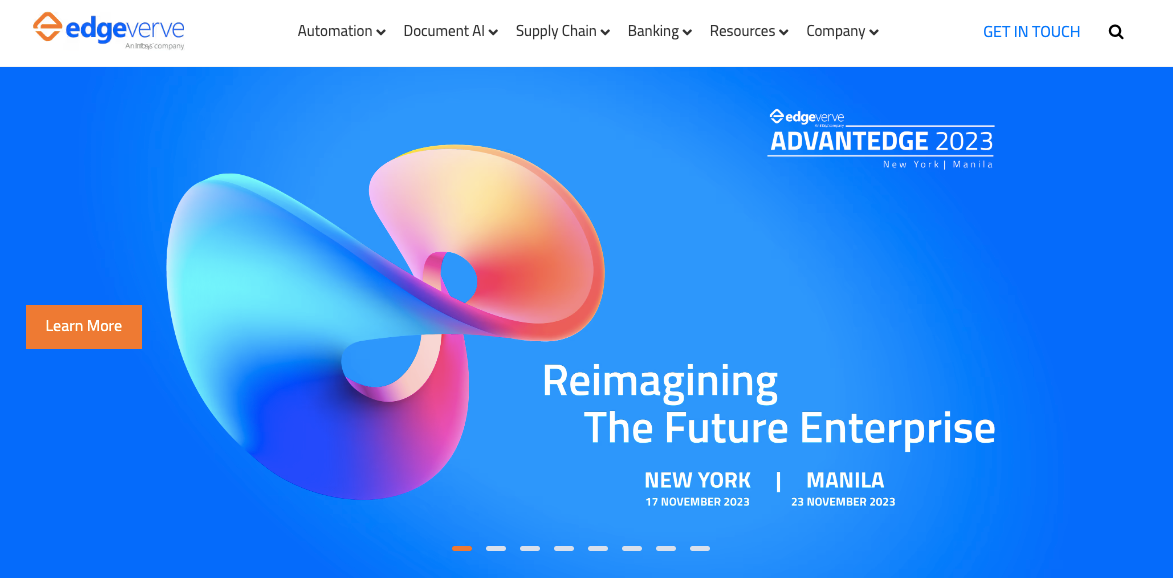
EdgeVerve is another provider in the industry that wants to give every business the power to benefit from Robotic Process Automation with its intuitive AssistEdge solution.
This end-to-end automation offering helps businesses of all sizes automate crucial tasks in their workforce. AssistEdge comes with process discovery, RPA, and orchestration functionality so that you can manage your entire automation journey from a single interface.
Founded: 2014
Target Industries:
EdgeVerve's RPA solutions cater to organizations across various industries, such as banking, financial services, insurance, healthcare, retail, manufacturing, and telecommunications.
Key RPA features:
- Combining Automation and AI: EdgeVerve's product roadmap emphasizes RPA governance and a sophisticated approach to automation that integrates AI. The company leverages its Infosys Nia division to manage the union of AI and automation effectively.
- Integration capabilities: EdgeVerve RPA can seamlessly integrate with existing systems and applications, facilitating smooth data exchange and interoperability.
- Customer Engagement: With a strong services component, Infosys facilitates the rapid deployment and overall scaling of RPA projects. EdgeVerve provides support for build and design, ensuring a smooth customer engagement experience.
Pros:
- Advanced AI capabilities improve automation accuracy and decision-making.
- End-to-end process orchestration enables the automation of complex business processes.
- Strong emphasis on enterprise-grade security and compliance.
- Robust analytics and reporting features for process optimization.
- Seamless integration capabilities with existing systems and applications.
Limitations:
- Specific pricing information and package details may vary and require contacting EdgeVerve directly.
- The learning curve for implementing and configuring the solution may be steep for some users.
- Limited availability of community support compared to more widely adopted RPA platforms.
Pricing:
For specific pricing information and package details, it is recommended to contact EdgeVerve directly, as pricing can vary based on the specific requirements and scale of the organization.
7) Automation Anywhere
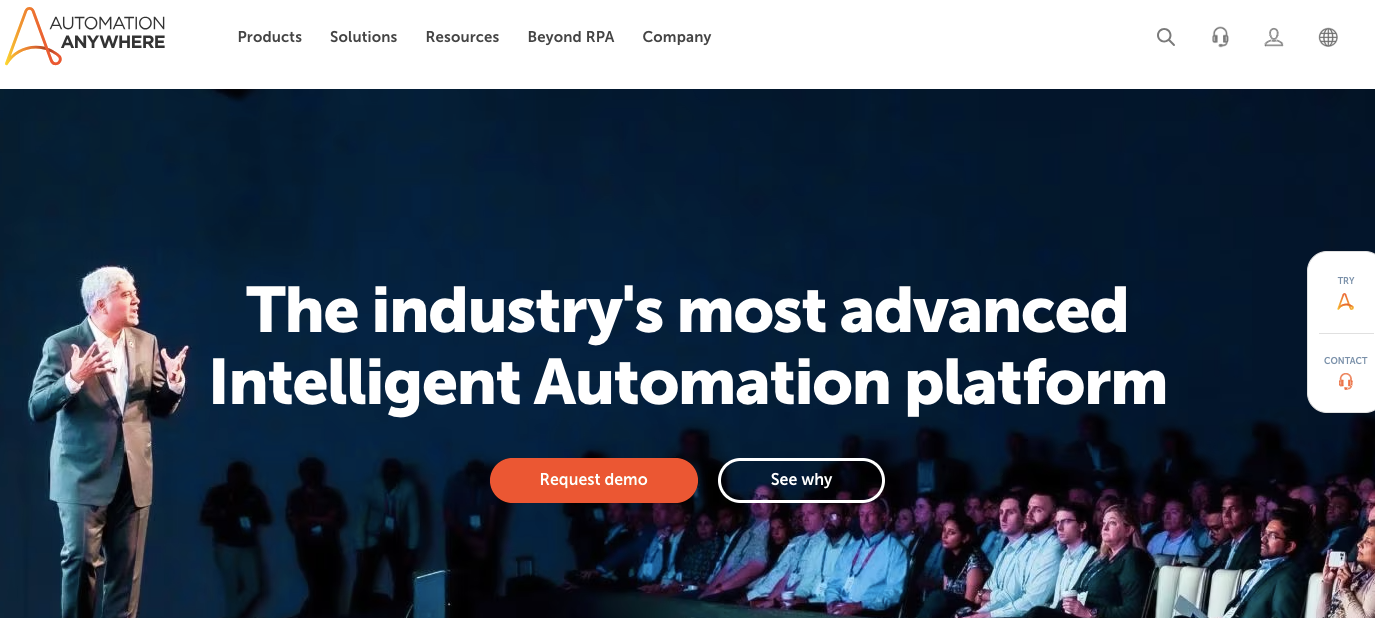
Automation Anywhere is a dedicated RPA company. The company offers a wide range of simple and engaging solutions for building robust RPA systems. This includes their IQ Bot, BotFarm, Bot Store, and Bot Insights.
According to the Automation Anywhere team, it’s the company’s goal to deliver RPA solutions that any business can use with ease. Also, with Automation Anywhere, you get enterprise-level technology with consumer-level ease.
Founded: 2003
Target Industries:
Automation Anywhere is designed to cater to a wide range of industries and organizations of various sizes. Its target users include businesses across sectors such as banking, finance, healthcare, manufacturing, retail, and more.
Key RPA Features:
Cognitive Automation: Automation Anywhere offers cognitive automation capabilities, enabling bots to understand and interpret unstructured data such as emails, documents, and images. This allows for more advanced automation scenarios and increases the efficiency of data-driven processes.
Process Analytics: Automation Anywhere includes robust analytics capabilities that enable users to monitor, analyze, and optimize their automated processes. It provides real-time insights and reports on process performance, helping organizations identify bottlenecks and improve efficiency.
User Interface: Automation Anywhere's platform is designed to make routine bot automation easy to build. Its cloud-based and SaaS-accessible solution enables the assembly of web-based software robots with relative simplicity.
Orchestrator: Automation Anywhere provides a centralized control and management hub called Orchestrator. It allows users to schedule and monitor bot activities, manage credentials, and track overall automation performance from a single interface.
Pros:
- Comprehensive automation capabilities with support for both attended and unattended automation.
- Strong security features to protect sensitive data and ensure compliance.
- User-friendly interface and intuitive bot development tools.
- Integration with various systems and applications, enabling seamless automation across multiple platforms.
- Extensive community support and a vast library of pre-built automation components.
Limitations:
- The pricing structure may be complex and tailored to individual customer requirements.
- Advanced features and functionalities may require additional licensing or add-ons.
- The steep learning curve for beginners with a limited technical background.
- Some users have reported occasional performance issues or instability.
Pricing:
Automation Anywhere offers flexible pricing options based on individual business requirements.
8) Blue Prism
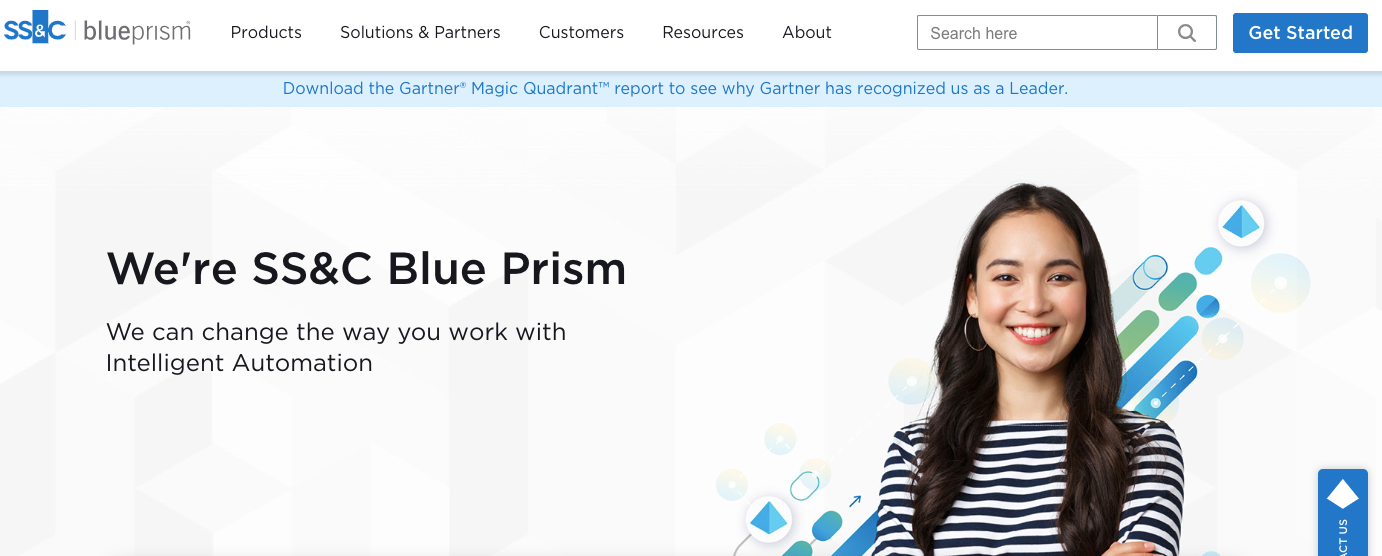
Founded in 2001, Blue Prism claims to have invented the term Robotic Process Automation. It offers a software platform to help organizations develop a digital workforce while making business operations more agile and cost-effective.
Founded: 2001
Target Industries:
Blue Prism is designed for enterprises and organizations across various industries that seek to automate their business processes.
Key RPA Features:
-
Scalability and Security: Blue Prism offers a scalable and secure automation platform that can handle complex business processes. It provides enterprise-grade security measures to protect sensitive data and ensure compliance with regulatory standards.
-
Visual Process Design: Blue Prism's platform utilizes a visual design interface that allows users to easily create and modify automated processes. Its drag-and-drop functionality enables non-technical users to design automation workflows with minimal coding.
-
Robust Control Room: Blue Prism's Control Room serves as a central hub for managing and monitoring automation processes. It provides features such as scheduling, workload management, exception handling, and auditing, ensuring efficient control and visibility over the automation environment.
-
Intelligent Automation: Blue Prism integrates AI capabilities into its RPA platform. It supports AI technologies like optical character recognition (OCR), natural language processing (NLP), and machine learning (ML), enabling advanced automation scenarios and cognitive capabilities.
-
Easy Integration: Blue Prism offers extensive integration capabilities, allowing seamless connectivity with various enterprise systems, databases, and applications. It enables organizations to automate end-to-end business processes by interacting with legacy systems and modern digital technologies.
-
Exception Handling and Error Management: Blue Prism includes robust exception-handling features to handle unforeseen errors and exceptions during the automation process. It provides customizable error management and recovery mechanisms, reducing manual intervention and ensuring process continuity.
Pros of Blue Prism:
- Strong security and compliance measures
- The visual and user-friendly process design interface
- Scalable and robust automation capabilities
- Advanced AI integration for intelligent automation
- Extensive integration options for seamless connectivity
- Dedicated control room for efficient process management and monitoring
Limitations:
- Relatively higher pricing compared to some competitors
- The steeper learning curve for non-technical users
- Limited community support compared to open-source RPA tools
Pricing:
Blue Prism offers enterprise pricing based on the specific needs and requirements of each organization.
9) Fortra

Fortra, previously known as HelpSystems, is introducing companies of all backgrounds to the benefits of RPA with their state-of-the-art automation solution.
The platform ensures that businesses can create comprehensive and intuitive robots that communicate with their existing business systems and applications to reduce the burden on their human employees.
Founded: 1982
Target Industries:
Fortra's RPA solutions are designed for businesses across various industries, including finance, healthcare, manufacturing, retail, and more. It caters to organizations of all sizes, from small businesses to large enterprises.
Key RPA Features:
-
Workflow Designer: Fortra offers a visual workflow designer that allows users to create and automate complex business processes through a user-friendly interface. It enables users to build automation workflows using drag-and-drop functionality and pre-built actions.
-
Integrations and Connectivity: Fortra' RPA platform provides seamless integration capabilities with a wide range of applications, systems, and databases. It enables users to automate processes by interacting with legacy systems, web applications, APIs, and more.
-
Centralized Control and Monitoring: Fortra offers a centralized control centre that provides visibility and management of automation processes. It allows users to schedule, monitor, and control the execution of automated tasks, ensuring efficient workflow management.
-
Exception Handling: Fortra's RPA tools include features for handling exceptions and errors during the automation process. It provides options for defining custom error-handling mechanisms, enabling the system to handle unexpected scenarios effectively.
-
Security and Compliance: Fortra prioritizes security and compliance in its RPA solutions. It incorporates encryption, access controls, and audit logs to protect sensitive data and ensure regulatory compliance.
Pros of HelpSystems:
- The user-friendly visual workflow designer
- Seamless integration capabilities with various systems and applications
- Cognitive automation capabilities for intelligent processing
- Centralized control and monitoring for efficient management
- Strong focus on security and compliance
Limitations:
- Limited community support compared to some other RPA providers
- Pricing may be relatively higher compared to certain competitors
Pricing:
Fortra provides customized pricing based on the specific requirements of each organization. The pricing model typically considers factors such as the number of users, processes, and deployment options.
10) NICE
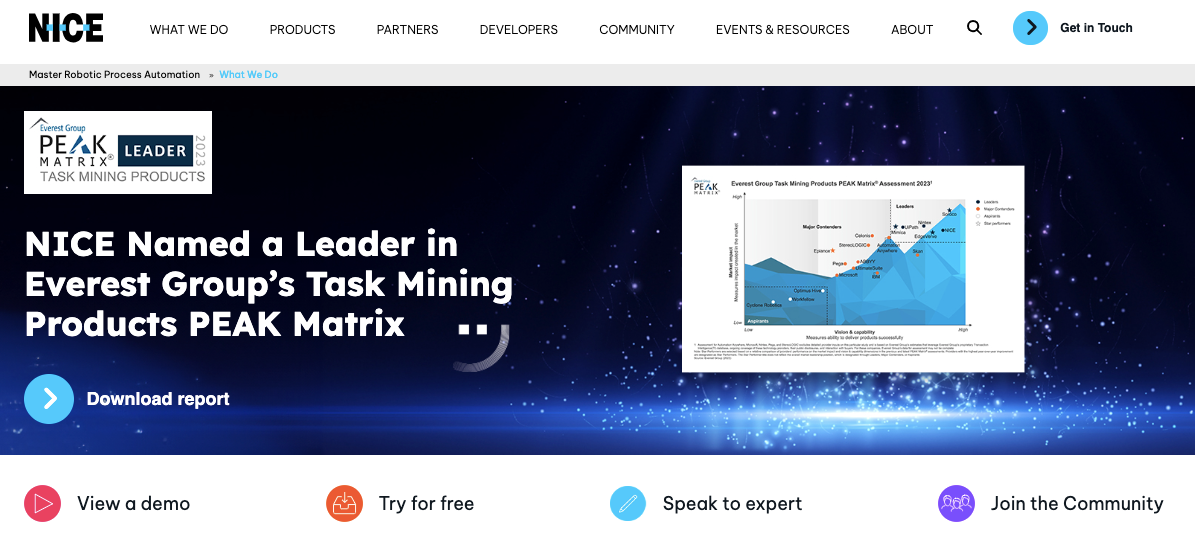
NICE RPA is a robust and intelligent automation solution designed to streamline business processes and enhance operational efficiency.
With its advanced capabilities, including AI-driven automation, desktop automation, and process discovery tools, NICE RPA empowers organizations to automate repetitive tasks, optimize workflows, and make data-driven decisions.
The user-friendly interface and comprehensive analytics provided by NICE RPA enable businesses to design, develop, and deploy software robots effectively.
Founded: 1986
Target Industries:
NICE's RPA solutions target enterprises and organizations across different industries that aim to automate and optimize their business processes. It caters to businesses of all sizes, from small businesses to large enterprises.
Key RPA Features:
-
Intelligent Automation: NICE's RPA platform utilizes advanced technologies such as AI and machine learning to enable intelligent automation, allowing businesses to automate complex tasks and decision-making processes.
-
Desktop Automation: NICE offers desktop automation capabilities that enable the automation of repetitive tasks performed on individual desktops, increasing productivity and reducing errors.
-
Process Discovery and Analysis: NICE provides tools for process discovery and analysis, allowing businesses to identify and analyze potential automation opportunities and optimize their workflows for greater efficiency.
-
Bot Development and Deployment: NICE offers a user-friendly interface for designing, developing, and deploying software robots (bots) to automate business processes. It provides a range of automation tools and features to support bot development.
-
Analytics and Reporting: NICE's RPA platform includes analytics and reporting capabilities, allowing businesses to gain insights into their automation performance, monitor bot activities, and make data-driven decisions for process improvement.
Pros:
- Advanced intelligent automation capabilities
- User-friendly interface for bot development
- Process discovery and analysis tools for identifying automation opportunities
- Analytics and reporting features for monitoring and optimizing automation performance
Limitations:
- Pricing information is not readily available and may vary based on individual requirements
- Limited information on community support and user base compared to some other RPA providers
Pricing:
Pricing details for NICE's RPA solutions are typically provided on a custom basis, tailored to the specific requirements of each organization.
11) Nintex RPA
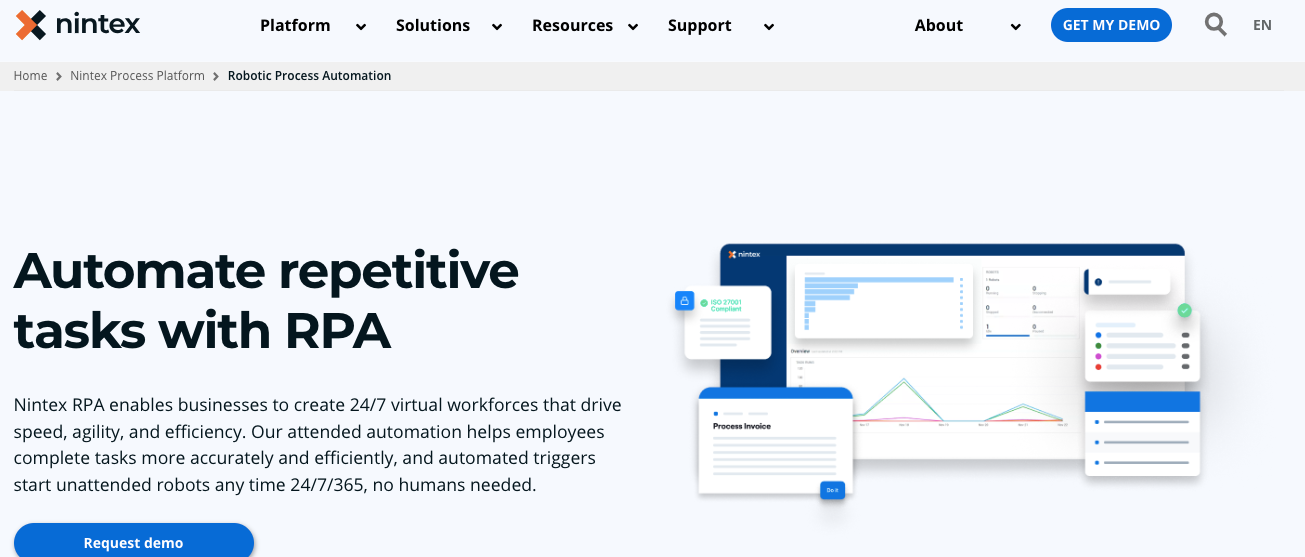
Nintex RPA is a powerful automation platform that helps businesses streamline their processes and accelerate digital transformation. It is designed for organizations of all sizes and industries that aim to automate repetitive tasks, improve operational efficiency, and enhance employee productivity.
Key RPA Features:
- Visual Designer: Nintex RPA offers a user-friendly visual designer that allows users to create automation workflows with ease, even without extensive coding knowledge.
- Integration Capabilities: The platform integrates seamlessly with various systems and applications, enabling automated interactions and data exchange.
- Intelligent Automation: Nintex RPA leverages AI and machine learning technologies to enable intelligent decision-making and process optimization.
- Centralized Management: It provides a centralized dashboard for managing and monitoring automation processes, allowing for better control and governance.
- Scalability: Nintex RPA can scale to accommodate the automation needs of growing businesses and handle large volumes of tasks efficiently.
Pros:
- User-friendly interface and visual designer
- Robust integration capabilities
- Intelligent automation with AI capabilities
- Scalability for growing businesses
- Strong support services
Limitations:
- Some advanced functionality may require additional customization
- Pricing may be more expensive for smaller businesses
Pricing:
Nintex RPA offers various pricing plans tailored to the specific requirements of each organization.
12) ServiceNow:
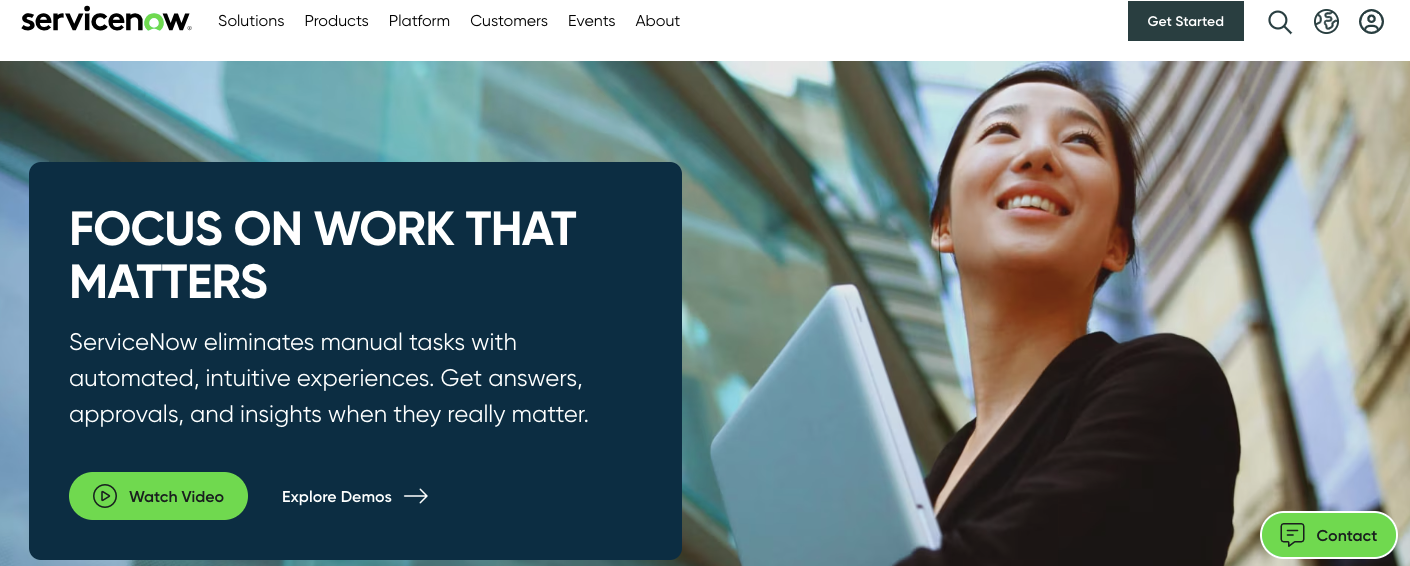
ServiceNow's RPA solution is designed to automate repetitive tasks and streamline workflows within organizations. It targets a wide range of users across industries, including IT departments, HR, finance, and customer service teams.
Key RPA Features:
- Integration with ServiceNow's IT Service Management (ITSM) platform
- A visual workflow designer for creating automation workflows
- Robotic Process Automation bots for executing tasks
- AI-powered chatbots for enhanced customer support
- Analytics and reporting capabilities for performance monitoring
Pros of ServiceNow RPA:
- Seamless integration with ServiceNow's ITSM platform
- Extensive automation capabilities across various business functions
- Strong IT service management features
- Scalable solution suitable for large enterprises
- Access to a wide range of ServiceNow's additional products and services
Limitations:
- The complex implementation process for organizations without prior ServiceNow experience
- Pricing may be higher compared to some other RPA providers
- Customization options may require additional expertise and resources
Pricing:
ServiceNow's RPA solution can vary based on the specific requirements and scale of the organization.
To Sum It Up
Robotic Process Automation (RPA) has emerged as a transformative technology, offering businesses innovative ways to automate their processes and make accurate decisions.
Experience Seamless Automation: Discover Our RPA Services
From repetitive tasks to complex workflows, our RPA services automate it all.

RPA combines automation and cognitive technologies like Artificial Intelligence and Machine Learning, enabling bots to make intelligent decisions and streamline repetitive tasks.
As RPA continues to disrupt the conventional business landscape, choosing the right RPA service provider becomes crucial for successful RPA implementation.
By selecting the right RPA partner, businesses can leverage the power of automation and drive revenue while achieving their unique business goals.



.png?width=344&height=101&name=Mask%20group%20(5).png)







.webp?width=352&name=ezgif.com-gif-maker%20(37).webp)








